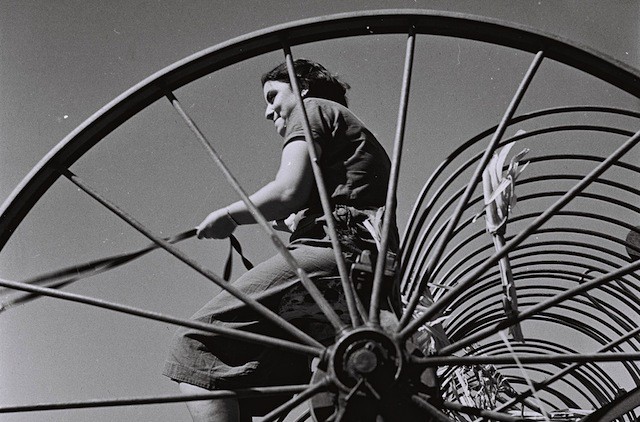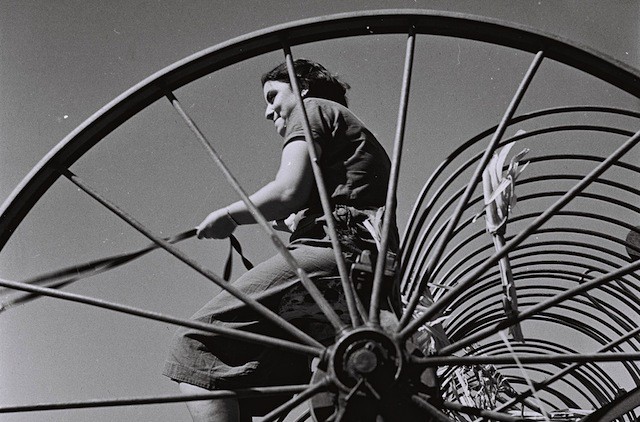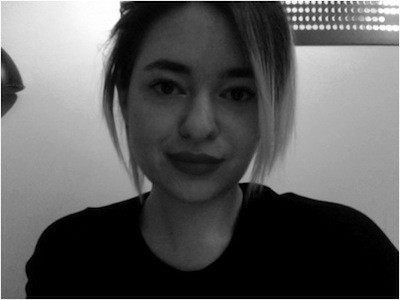Internet Work and Invisible Labor: An Interview With a Virtual Assistant & Publisher
by Anne Helen Petersen


This interview series aims to make the “invisible labor” of web production visible. Over the next few months, I’ll be talking with a wide variety of content producers, exploring the dynamics of their own form of web production, how they mix that production with their “real” lives, and the various forms of gratification they receive from the work that they do. In short: how do you do what you do, and why do you do it? Talking about the realities of labor isn’t narcissistic. It’s political, it’s progressive, it’s feminist. It’s also totally fascinating.
So read on, and please feel free to pose additional questions in the comments.
Haley Mlotek is a virtual assistant (but it’s nowhere near a “nightmare”), the publisher of WORN Fashion Journal, and a freelance writer. Previously, she worked as the PR Intern for The Hairpin, an assistant fashion buyer, office manager, legal secretary, makeup artist, and retail salesperson.
Tell me about how you first got involved with doing work on the internet. What kind of work were you doing?
My first official “internet profession” was as Jennifer Dziura’s virtual assistant. But in my other jobs, I was still always on the internet: when I worked retail, I was always sneaking really quick visits to Facebook; when I worked desk jobs, I would spend hours a day on blogs and Tumbr. As a legal secretary, I think it’s fair to say I did about three hours of real work a day and spent the other five reading online. I actually developed a dependence on computers and other technology — I felt anxious being away from the computer because that job was so fucking boring and I couldn’t handle being left alone with my own thoughts.
When I worked as the assistant to a boutique owner in Toronto, I became really enamoured with the fact that my boss had more or less built a mobile “head office.” We had offices at the store, of course, but she had developed this system where she could get to work anywhere, anytime — from an airport lounge or a hotel room. She had a laptop, a calendar, a calculator, stapler, pens and pencils, and on the days she came into the office, she would arrange everything in this perfect U-shape around her hands, and the first time I saw her do that, I knew that was what I wanted. I wanted to be able to be so in control of the work that I produced that I could do it literally anywhere, anytime, any place. I’ve been working that way since February 2012 and I can’t imagine going back.
A little context: WORN Fashion Journal is a volunteer operation, so no one gets paid, not even the editor-in-chief, Serah-Marie McMahon, or myself. Our staff members donate 5–10 hours of their time a week in order to balance their WORN time with their jobs and education and lives. Serah-Marie and I work on WORN full-time, but we both have other jobs to, you know, pay our rent and eat and stuff. I’d been working as the promotions manager for about a year and a half when Serah-Marie and our managing editor Gwen asked me to start working full-time as the publisher. I was trying to figure out if I could balance spending so much time on unpaid work with the question of food and shelter, and that’s when I found the virtual assistant job.
Then, in 2013, I started to add a lot more freelance writing to my virtual work. I had done a few articles for the Toronto Standard (I’m the most proud of this one) but I didn’t really know if I was a “real writer.” I first pitched to Alexandra Molotkow, who I knew as a fellow Hairpinner before I even knew she was my literal neighbor, and is a senior editor at Hazlitt, an online literary magazine. Then I started writing for The National Post, The L.A. Review of Books, The New Inquiry. I got those jobs almost entirely from a few well-written and persuasive emails.

Did you see this as a career? Why or why not?
I always wanted WORN to be my real, full-time career, but I didn’t see how that was possible without any income. Working for Jen and as a freelance writer seemed like a temporary solution at first; now, I don’t think I would or could go back to doing just one thing. I’ve never done that. I started working retail in high school, and I was never a full-time university student, I always worked and took classes part-time.
When I worked retail during high school and university, or when I worked as a makeup artist, it was assumed I was just doing this until something better or “realer” came along. I got in the habit of not being too attached. When you’re working in a bad retail environment, they really stress how disposable you are, so I used to think nothing of quitting and moving on. The closest I came to working just one job full-time was at the law firm, and that was probably the lowest emotional point of my life. At the time, I was just like, “Well, I’ll spend eight hours a day doing something I hate, but then I’ll have good money and all this free time to spend it evenings and weekends!” But that’s just not who I am.
I still consider WORN my career, but now I think I’ll always be doing some variation of this current schedule: working primarily for an organization I really believe in, assisting someone I respect and admire who provides me with challenging and well-paid work, and working on my own personal projects as a writer. Jen has talked a lot about multiple income streams, and I think it’s the only way to go. No one gets everything they want out of one job, so I think it’s much more satisfying to build a career out of various elements that speak to all the different things I want to do and accomplish.
I also think that’s really only possible with Internet-based jobs. If I had to be in a physical location at set times to do any of these jobs, I don’t know if they would work so well; the fact that WORN is structured to run with volunteers all over the world means that the bulk of labor is done in Google Docs and Dropbox, so even that is fairly flexible.
So a “virtual assistant” — I personally think immediately of the virtual assistant from Gone Girl. I imagine that’s not what it’s like. How did you even think of this as a job?
I don’t even know if I knew it was an option before Jen! If I had thought of it at all, it was probably as part of some Internet scam — one of those “this mom makes $5000 a day working from home” ads you see all over the Internet. Even now, when I tell people I work as a virtual assistant, they’re like, does that mean you’re a robot? To which I always reply: actually, I prefer cyborg. The job itself is so great because it has certain core elements that stay the same — like writing and communication, admin, design, etc. — but the applications always change. To put it very, very simply: my job is anything Jen needs me to do that can be done with a phone and laptop.
How did you find the gig in the first place?
I had been reading Jen’s column, Bullish, for a while. I actually came across it when I was doing research for WORN, looking for blogs and writers to send the magazine to, and I stumbled across Maybe Work-Life Balance Means You Should Work MORE. At the time I was working about 15 hours a week at the magazine, 40–50 at the boutique, and I had just started writing for the Toronto Standard. A lot of my friends and family were not super supportive of this schedule — they thought I was overextending myself, and I was always like, well, yes.
Jen’s article was like the perfect antidote to their overall sentiment of “relax, man,” which I’ve always hated. I immediately sent her an email that is, to this day, the greatest email pitch I have ever sent anyone, ever. (Jen wrote about it here and here.) She hired me a few days later and I’ve been working for her ever since.
Working for Jen is, I really think, the only way I could have managed to balance being the publisher of WORN and still support myself. I’m totally in control of where and how I get work done.
Tell me about what a typical day looks like for you.
I like to be up at 7:30 and at my computer immediately — checking email, Twitter, Facebook, and reviewing my to-do lists. Around 8:30 I eat breakfast and drink a bunch of coffee with my boyfriend before he goes to work. From 9 to 11 a.m. I work on one or two small, easily contained projects. I’ll stop around 11 a.m. to exercise and shower and eat. If I have to go out later I’ll brush my hair and put on makeup, but lately I’m really losing patience for all that shit.
At 1 p.m. I get back to work. Afternoons tend to be my WORN time. That’s when I’ll deal with bigger projects, things that take a long amount of time, so that I can work uninterrupted. Or else I’ll work on an article. Sometimes I’ll take a break to do housework, but it really depends on what makes me feel more guilty — like, what feels worse at that moment, I stay home all day and I still can’t manage to wash dishes, or I stay home all day and still can’t manage to sell ad space?
My boyfriend comes home around 7 and he usually makes dinner. In an ideal day, this would be when I step away from the computer and read, but honestly it just means I move from my desk to the couch with my laptop and do mindless work I can do while watching The X-Files, my current Netflix obsession. But I’m pretty good at stopping for real by 10 or 11 p.m., unless I have a deadline or a project I really want to finish.
I have a group of friends who I like to work with sometimes, mostly people who also work in independent publishing, and we’ll meet in the afternoon at coffee shops around Toronto. We keep each other on track, I think, and sometimes they bring me good luck — last week, I got a really lucrative job assignment just because my two friends pushed me into re-pitching something with a new angle. I ended up getting a substantial increase in my word limit and rate as a result.
All of this gets thrown out the window when I’m working on a really, really serious project. For example, when I’m writing a grant for WORN, or a very research-heavy article, I’ll just turn off my phone and shut down my web browser and go hard into one thing for 15 hours at a time. I do have this pseudo-romantic idea that I can’t be disturbed as a writer, that if I don’t sit down and start writing and keep going until I’ve gotten all my thoughts out they’ll vanish from my brain. I can do revisions in small healthy chunks, but I always want to finish the first draft all at once.

Can you talk a bit more about the dynamics of “assisting” vs. “producing”? Most of the people we’ve interviewed in this series have been the primary content producers. How do you conceive of your work differently as an assistant/invisible facilitator of that labor?
When you work in publishing, especially on the actual publishing side of things — the labor that doesn’t get a byline, I guess — you tend to be invisible. When people read an issue of WORN, they can’t see the work that I do the same way they see the work of a writer or stylist, because my work was all about getting them to pick up the magazine in the first place. My work for Jen is even more invisible because I do it so privately — i.e., I do it alone and often Jen is the only one who really sees it.
But I’ve always felt more comfortable as someone who facilitates production as opposed to being the person who produces. I’ve talked some shit about working retail and in offices, but those experiences did show me that I love being part of a well-oiled machine. Working at the boutique taught me the value of being a really, really, really good assistant — I took a lot of pride in helping my boss be the best owner and buyer she could be. I think this kind of work has made me even more organized and effective because I understand what it really takes to get something done. There’s no mystery in my work, no secrets — I see it all from start to finish, and I know what it really took to make it happen and how it can work better that time.
I think of writing as my time to be totally narcissistic and ego-driven in the best possible way. I’ve been extremely lucky in my writing career — that’s why I don’t mind being invisible for the bulk of my labor, and actually prefer it. I like the idea of being in a work cave and only peeking out every so often when I have something really great to share.
When your work is so malleable to your own time schedule, how do you achieve any sort of “work/life balance?” Does that even feel like a meaningful distinction for you?
This is a question I keep asking myself more and more. As much as I value my freedom, as long as I’ve been working for myself I’ve still been tied to a schedule that’s almost 9 to 5, except a longer version, and I get to do it in a robe. And now, sometimes, when I stop to work out or eat a real meal or wash dishes, I’m consumed by an overwhelming amount of guilt. By contrast, when I would spend at least 70 percent of my office time on Tumblr, I never felt guilty; I was in an office so I was clearly working and had earned watching television all night. It’s such a destructive mindset.
In 2014 I want to work better, not more: to work when I’m working and relax when I’m relaxing, because I was doing that very common thing of blurring those lines. There were a lot of times in 2013 when I would get into such a panic if I felt like I was spending too long washing my face because those were precious seconds that I was wasting.
I also do think it’s really important that I never feel like I’m so busy I can’t be there for a friend. So that’s my version of work-life balance, I guess: work when I’m working, relax when I’m relaxing, be present for the people who matter to me, and fuck the haters. Not necessarily in that order.
What makes all the digital and behind-the-scenes labor worthwhile? Why, in other words, do you do what you do?
I’ve always wanted to have a calling. A job that I always knew I just had to do, or made me feel complete. I didn’t have that feeling until I started working at WORN. My work there isn’t easy, but I love doing it and I know I’m great at it. I think it’s because it’s some combination of really great writing, a subject I’m passionate about, and a niche that I do think needs to be filled in the existing marketplace for magazines. To me, that’s what makes WORN worthwhile.
Besides the actual work, the way I work is really important to me, as I’ve already mentioned a few times. I love having the freedom to do what I want when I want it, and I want to keep working like this for my entire life.
Previously: An Interview With Summer Anne Burton
Photo via government_press_office/flickr.
Anne Helen Petersen is a Doctor of Celebrity Gossip. No, really. You can find evidence (and other writings) here, and you can read the Scandals of Classic Hollywood series here.